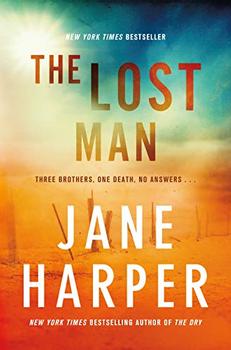Reading Guide Questions

Please be aware that this discussion guide will contain spoilers!
Welcome to the Reading Group Guide for The Lost Man. Please note: In order to provide reading groups with the most informed and thought-provoking questions possible, it is necessary to reveal important aspects of the plot of this novel—as well as the ending. If you have not finished reading The Lost Man, we respectfully suggest that you consider waiting before reviewing this guide.
- Carl Bright is shown through the novel to have been an aggressive and violent man, but his abuse was not always of a physical nature. What does the novel have to say about the power wielded by a perpetrator of domestic violence, and the long-lasting effects of that abuse?
- How does the secretive nature of domestic violence protect the perpetrator? How do the ideas of fear and shame hinder victims from seeking help? Are there any other reasons the Brights might not have sought help for their situation?
- Sheer distance and isolation impacts the way crimes are responded to and investigated in the outback. What effect did the lack of police and medical support have on the outcomes for the rape of Jenna Moore, and the death of Cameron Bright?
- Nathan is excommunicated from the local township when he doesn't stop to help Keith Walker on a remote outback road. What does this have to say about the nature of small, isolated communities? What are the advantages and disadvantages of communities such as these, do you think?
- Nathan, Cameron and Bub all suffered from their father's domestic violence against them and their mother through their childhood, but they have dealt with that abuse in very different ways as adults. What effect has that abuse had on each of the brothers? What are some of their different coping mechanisms? Which of them do you think has been the most successful at dealing with this traumatic childhood, and why?
- For those who have also read Jane Harper's The Dry, an interesting link is made between Liz Bright and her abusive brother, Malcolm Deacon. What could you infer from this connection?
- How has Nathan's upbringing affected his approach to parenthood? How do the events of the novel influence his attitude towards how he interacts with Xander and Jacqui in the future?
- Nathan must confront many of his demons over the course of this novel. What is it that allows him to make such progress, do you think?
- Nathan's impression of Cameron changes as he gets closer to the truth about Cameron's death. How and why does it change?
- In spite of the family's persistently low expectations of Bub, it is Bub who is the most perceptive about Cameron here. In what other ways is Bub underestimated in the novel? How do you think the insistence of the other characters to refer to him by his childhood nickname might have affected him as he grew up?
- Over the course of the novel, Cameron Bright is revealed to us as someone who had both good and not so good qualities, which he hides well. What were some of the ways Cameron manipulated the people around him? Why and how did he get away with it?
- In spite of the influence Cameron had on those around him, all the other characters in the novel benefit in some way from his death. In what ways are they now better off? Do you think this justifies Cameron's death in any way?
- Nathan tells us that Cameron was Carl's favored son. What effect might this favoritism have had on Cameron, and his two brothers?
- Did you suspect at any point that Liz might have been in involved in Cameron's death? Why or why not, do you think? With the benefit of hindsight, what signs were there that might have thrown suspicion on Liz, or, in contrast, diverted attention away from her?
- What do you think about what Liz did, both to Carl and to Cameron? Do you think that her actions were justified? Do you think Nathan is doing the right thing when he decides to keep her secret?
- The remote Queensland outback and its fictional town of Balamara is the central setting of the novel. How does this remote, isolated setting inform our ideas about the people who live there and the events that take place there? How does the setting itself impact the events of the novel?
- The stockman's grave is the scene of several major events in this book. It is the location of Cameron's death, it is the focal point of Ilse's escape plan, and it is the source of Cameron's prize-winning painting. In what ways does the idea of this lonely grave permeate the novel? What does it have to say about outback life, both now and in the past?
- Jane Harper has chosen to tell this story in the third person past tense, entirely (with the exception of the prologue) from Nathan Bright's point of view. What is the effect of this?
- The novel begins with a prologue from an omniscient viewpoint that describes the bleak setting of Cameron Bright's death. Why do you think the author chose to introduce the events of the novel in this way?
- Throughout the novel, several characters tell different versions of the story of the stockman buried in the stockman's grave. It is Nathan who tells the true story at the novel's conclusion. What might this tell us about the nature of stories, and the nature of truth? Can you draw any parallels between this and any other stories told in this novel?
Unless otherwise stated, this discussion guide is reprinted with the permission of Flatiron Books.
Any page references refer to a USA edition of the book, usually the trade paperback version, and may vary in other editions.

 Book Reviewed by:
Book Reviewed by:





